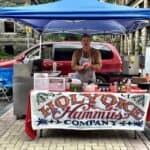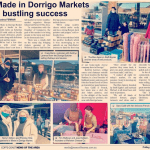I often hear jovial stories and stereotypes, in and out of rural places, about how small-town people are stuck in the 1960s and refuse to accept change. They joke that we nostalgically hang on to our traditions, our history, our ways of doing things, and our small-town values. Personally, I choose to live in a small town because it’s safe, close to family, and offers me the quality of life I need.
I don’t appreciate these generalizations and stereotypes about how rural people are stuck in an outdated place. Those words certainly don’t represent the community leaders I work alongside every day. But don’t misunderstand, there are people leading and living in rural places that are stuck in an old system and their hard truth is, it’s not 1969 and it never will be again.
The conversation about change in rural places is certainly necessary, but hard. Often, when people courageously open up that conversation, it creates a barrier to progress because we aren’t listening to understand. The barrier occurs because the emerging system feels held back and the existing system feels pushed away. We must recognize that existing systems are not bad, but they do need to be nurtured toward the emerging system that is always certain to develop.
I have recently experienced some Aha! moments that have the potential to make our rural communities move toward an emerging system that can make us stronger, better, and hopeful again.
Aha! #1 – There is a new 3-legged stool of economic development.
The old 3-legged stool includes traditional areas of economic development:
- business retention and expansion;
- business attraction; and
- business creation/entrepreneurship.
The new 3-legged stool focuses on creating a community where people want to live. The reason for this change is because our emerging workforce is choosing a place before selecting a job. The three legs of this stool are:
- Business Development (create, attract, retain, expand);
- Talent Development; and
- Place Making.
Working on these three aspects together, creates a place where our main streets and industry connect; youth are being educated and encouraged to return home to add value to the local economy; and the community has a strong quality of place focused on the health & wellness, citizen engagement, daycare, housing, education, art & culture, and events.
Aha! #2 – We must acknowledge that our own presence does matter in our community.
I heard Whitney Kimball Coe, Director of National Programs at the Center for Rural Strategies state, “Many of our communities are run by men of a certain age who like to explain things.” This stereotype of ‘old white guys’ struck a chord with me when I heard her say those words. I saw others in the room bristle at her words. I am grateful for the dedicated men who built a strong foundation for the community I call home. They have supported me in making change. Yet, I know Whitney’s words to be true. I was the only woman to serve on my city council in 113 years. I serve on many boards that are mostly men. I also work in other rural communities where this is a barrier to progress.
Similarly, Joe Bartmann, President of Dakota Resources says, “More leaders are not needed in rural communities. The old way of leading is obsolete. Something must change to engage the greater community so they become empowered to embrace the vision they have for their community and shape it into the place they want to live.”
There are people full of energy for change rising up in our rural communities. They are creative, passionate, and want to change the existing systems of leadership and organizations to accommodate a more empowered citizen-base. This emerging system allows more people to step-up and support the creation of a thriving community. It takes in to consideration things like work/life blend and working on what matters to individuals and their crowd.
Aha! #3 – Make thriving more important than growing your community!
The Argus Leader recently posted a headline, “Rural South Dakota is losing people while bigger metros gain.” This article was also picked up by the The Seattle Times with the headline, “More than half South Dakota communities losing population”. You can’t just read the headlines to get the full story. Jessica Schad with South Dakota State University Data Center provided the numbers to prove those headlines true and, also stated, “Population loss doesn’t mean that communities aren’t strong.”
Many small towns are beginning to take a different look at how they define and measure success in rural South Dakota. Instead of measuring success on traditional sales tax and population growth, these communities are looking at what matters to them and coming up with their own indexes and definition of success.
There is a new rural emerging and it looks like a place where the community is:
- Making thriving more important than growth.
- Filled with courageous people willing to have hard conversations; facing the reality of where they’ve been and where they are going.
- Empowering people to take part in planning for and creating local outcomes.
- Building up spaces that create community connections through education, art, culture, and more.
- Becoming not-knowers; a community willing to ask questions and find the answers together, rather than pretending to need to know all the answers.
- Acknowledging and embracing the many visions living within the community.
Together we can become the shapers of a thriving new rural. Let’s release old stereotypes and visions of our past to create the community we all want to live in. And, the key to making this happen is that we ALL need to keep showing up, over-and-over-and-over again, even the old white guys. #Iamrural
- About the Author
- Latest by this Author
The Community Coach. Having a passion for community leadership and development is what drives Paula Jensen’s personal and professional life. Paula lives in her hometown of Langford, South Dakota, population 318+. She serves as a Strategic Doing practitioner, grant writer and community coach with Dakota Resources based in Renner, South Dakota. Dakota Resources is a mission-driven 501c3 Community Development Financial Institution working to connect capital and capacity to empower rural communities. Contact her at paula@dakotaresources.org.










